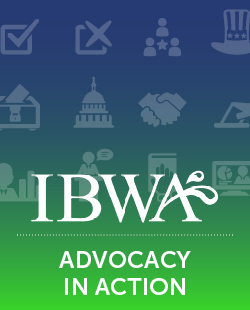Letter to New Hampshire House of Representatives on SB 410
Letter to New Hampshire House of Representatives on SB 410
April 11, 2002
Dear Representative:
The International Bottled Water Association (IBWA) is writing you in support of the Majority Report on SB 410 of the House Resources, Recreation, and Development Committee, and in opposition to the Minority Report. The issues raised by SB 410 are extremely complex and deserve much greater research and public discussion before enacted. Outlined below are some of our reasons for supporting further study and our opposition to the Minority Report. IBWA respectfully requests your support for the Majority Report on SB 410.
IBWA is the trade association representing the bottled water industry. Founded in 1958, IBWA member companies account for more than 80 percent of all bottled water sales in the U.S. The association’s membership includes domestic and international bottlers, distributors, and suppliers. Our New Hampshire-based members include Balsam Spring Water, Castle Springs, L & C Supply, Monadnock Mt. Spring Water, Northern Springs, Twin Mountain Spring Water, and White Ribbon Spring Water.
IBWA supports comprehensive groundwater resource management and enclosed for your information is the association’s policy paper on this issue. The Minority Report will not accomplish comprehensive management and protection of this renewable resource because it:
-
- is not comprehensive and multi-jurisdictional (grants local authority for groundwater withdrawals, except quantity);
-
- does not treat all users equitably (only regulates commercial withdrawals); and does not further the scientific basis for regulating groundwater withdrawals (does not provide for state planning and determinations of “safe yields” for aquifers).
- does not treat all users equitably (only regulates commercial withdrawals); and does not further the scientific basis for regulating groundwater withdrawals (does not provide for state planning and determinations of “safe yields” for aquifers).
I. Local Authority
The Minority Report would amend current law to grant municipalities the authority to regulate commercial groundwater withdrawals, except for quantity. This would be a substantial change from the current law, which reads
“Nothing in this chapter shall be deemed to preempt the authority of municipalities, under other statutes, to enact local ordinances or regulations affecting groundwater, other than groundwater withdrawals; provided, however, that requirements imposed under this chapter shall be considered as minimum.” (Emphasis added.)
The Minority Report remains unclear on how the newly-granted municipal authority would have on the large groundwater withdrawal permitting process. Under the definition of “withdrawal site” in this report, a business or other water user trying to permit a 57,600 gallons per day well might have to deal with a number of municipalities. This could result in a patchwork of local ordinances, with which the commercial entity is expected to comply and could ostensibly become a veto over any commercial uses, because all commercial large groundwater withdrawals must comply with local ordinances, including groundwater withdrawal ordinances.
The Minority Report would also grant extensive authority to localities to organize a review committee to review commercial groundwater withdrawal applications and provide recommendations to the Department of Environmental Services on an application. However, the legislation also allows the review committee to hire experts to perform “technical reviews” of the application and then to bill the business who has submitted the application the costs of the experts. The review committee, as representatives of municipal governing bodies, should be able to finance such technical assistance from the local budgets, if it is deemed by the community to be a priority.
Municipal input must be a part of the planning process for a comprehensive management approach, but localities should not be able to regulate groundwater withdrawals nor invoice a business for experts it wishes to retain to participate in the application process.
II. Narrow Scope for New Requirements
The new requirements envisioned by the Minority Report for large groundwater withdrawals will only apply to a very small fraction (less than 20%) of all groundwater withdrawals (see enclosed chart), if the state’s fish hatcheries are excluded from the definition of “commercial.” The bottled water industry is an even smaller fraction of large groundwater withdrawals in New Hampshire, at less than 0.5%. As currently drafted, the business community will have to bear the entire burden and impact of this legislation.
By focusing on “commercial withdrawals,” the Minority Report does not provide a comprehensive basis for managing this precious and renewable resource for future users. In fact, commercial entities that use large quantities of water can avoid all of the new requirements by simply using a public water system to provide the needed water with the same impact on the aquifer, but not the same regulation.
III. Need for Better Data and Planning
The Minority Report nor the Senate passed version of SB 410 do not require the state to develop a state groundwater management plan. An applicant for a large commercial withdrawal, however, would have to demonstrate that it does not compromise “the future use of groundwater established based on current zoning and reasonably expected land uses in the study area based on land use regulations of affected municipalities.” Without a comprehensive state plan and baseline data on the various aquifers and watersheds within the state, compliance with this provision will be impossible.
Some states have developed statewide or regional groundwater management planning. For example, Wisconsin has established a cross-disciplinary Groundwater Coordinating Council that is responsible for developing a long-range plan for comprehensive groundwater management. New Hampshire has been moving to a more comprehensive approach to groundwater management in recent years, but has not established such an approach to groundwater resource planning. In order to facilitate the development of such an approach, the DES should define the groundwater resources in New Hampshire and develop baseline data on the quantity of water within each aquifer and watershed.
The establishment of water budgets for groundwater basins is a laudable goal of state and regional water planning, and such matters should be reflected in a well-crafted state water plan. A water budget may be established for a given groundwater aquifer to define the available yield of the area under given conditions (for example, the annual yield in a 1-in-25 year drought), and in the permitting process, consideration would be given by the agency to the cumulative impact of all withdrawals from that aquifer compared to the available yield of the aquifer. Without such planning, this process is almost certainly doomed to fail in achieving the sponsor’s objectives.
It is for these reasons that IBWA believes the Minority Report is not the solution and this issue, groundwater resource management, needs further study. Our industry is dependent on the sound stewardship of this natural resource for our future. IBWA is willing to continue to participate in helping develop a sound and comprehensive groundwater management approach for the state.
IBWA If you have any questions, please do not hesitate to contact IBWA.
Sincerely
Patrick B. Donoho
Vice President, Government Relations
Enclosures (3)


